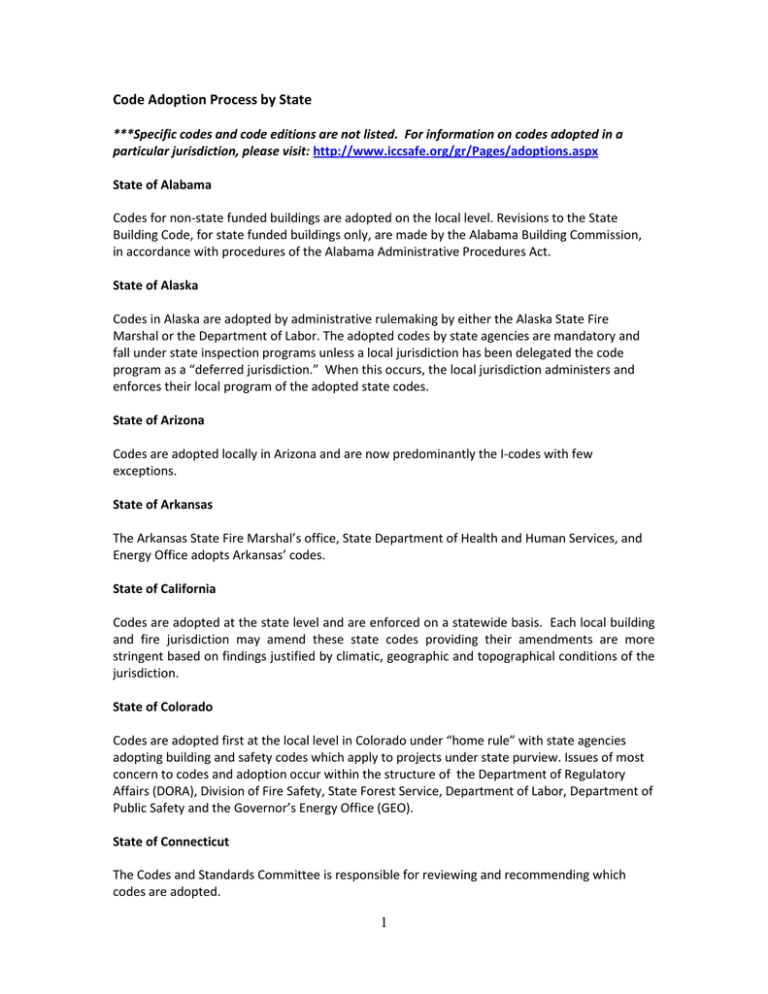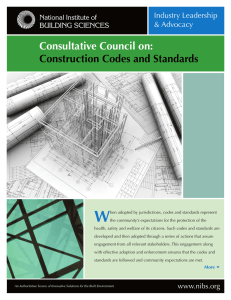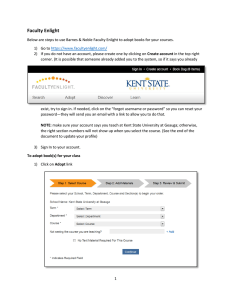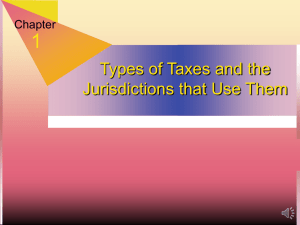How States Adopt the I-Codes
advertisement

Code Adoption Process by State ***Specific codes and code editions are not listed. For information on codes adopted in a particular jurisdiction, please visit: http://www.iccsafe.org/gr/Pages/adoptions.aspx State of Alabama Codes for non-state funded buildings are adopted on the local level. Revisions to the State Building Code, for state funded buildings only, are made by the Alabama Building Commission, in accordance with procedures of the Alabama Administrative Procedures Act. State of Alaska Codes in Alaska are adopted by administrative rulemaking by either the Alaska State Fire Marshal or the Department of Labor. The adopted codes by state agencies are mandatory and fall under state inspection programs unless a local jurisdiction has been delegated the code program as a “deferred jurisdiction.” When this occurs, the local jurisdiction administers and enforces their local program of the adopted state codes. State of Arizona Codes are adopted locally in Arizona and are now predominantly the I-codes with few exceptions. State of Arkansas The Arkansas State Fire Marshal’s office, State Department of Health and Human Services, and Energy Office adopts Arkansas’ codes. State of California Codes are adopted at the state level and are enforced on a statewide basis. Each local building and fire jurisdiction may amend these state codes providing their amendments are more stringent based on findings justified by climatic, geographic and topographical conditions of the jurisdiction. State of Colorado Codes are adopted first at the local level in Colorado under “home rule” with state agencies adopting building and safety codes which apply to projects under state purview. Issues of most concern to codes and adoption occur within the structure of the Department of Regulatory Affairs (DORA), Division of Fire Safety, State Forest Service, Department of Labor, Department of Public Safety and the Governor’s Energy Office (GEO). State of Connecticut The Codes and Standards Committee is responsible for reviewing and recommending which codes are adopted. 1 State of Delaware Building Codes are adopted at the county and municipal level, and smaller towns generally defer to the counties for code enforcement. District of Columbia DC City Council is the adopting authority in the District of Columbia. Building regulations in DC are initially developed by Construction Codes Coordinating Board (CCCB) that is staffed by the DC Zoning Department and is made up of representatives of the building industry (builders, architects, contractors, unions, etc.). Oversight of building codes is through the Department of Consumer and Regulatory Affairs. State of Florida Codes are adopted statewide with mandatory enforcement through the Department of Community Affairs. The Florida Building Commission is the code amending agency. State of Georgia Codes are adopted at the state level through the GA Department of Community Affairs Building Codes Division and the GA State Codes Advisory Committee (GSCAC). Although adopted at the state level, the choice of enforcement is left up to local authority having jurisdiction. State of Hawaii The Hawaii 2007 Legislature created a new Building Code Council Agency that has the authority to adopt any code(s) statewide. The Four County jurisdictions have 2 years in which to adopt and amend the State Code with local amendments. If the county jurisdictions do not comply within the 2 year time line then the State Code becomes the county’s code until such time the county passes an adopting ordinance. State of Idaho Building codes in Idaho are adopted by state statute. Local governments have the option to adopt additional codes in addition to those codes named in statute. Local amendments to state codes must be no less than the requirements as adopted by the state. State of Illinois Currently, State Board of Education (ISBE) enforces the building codes. All other codes in the state are adopted by local municipalities, fire protection districts and counties. State of Indiana The Indiana Fire Prevention and Building Safety Commission is responsible for all building, fire safety and building efficiency code adoptions in the state. 2 State of Iowa The State of Iowa imposes a combination of state required codes and locally adopted codes. When municipalities update their codes, they are required to update to the codes adopted by the state. The Iowa Plumbing and Mechanical Code Advisory council is responsible for the adoption of plumbing and mechanical codes in the state. Iowa codes including the Energy Code are adopted by the Iowa Building Code Bureau. State of Kansas The State of Kansas does not enforce a statewide building code, but authorizes local jurisdictions to adopt local building codes. State Fire Marshal enforces building codes for state owned buildings. Commonwealth of Kentucky The Kentucky Building Code (KBC) is updated every three years. Changes to the code by the Commonwealth of Kentucky are submitted to the Board of Housing, Buildings and Construction for review by the DHBC. The changes are approved in this forum and are forwarded to the Legislative Rulemaking Committee for public comment, further review and final approval. During the three-year cycle, proposed changes to the KBC may be submitted for consideration and voted upon by the board. The Division of Building Codes and Enforcement is responsible for complying with code changes and amendments. Once changes and amendments are adopted and entered as part of the state requirements, they become state law by the state statute. State of Louisiana Louisiana has a statewide adoption with mandatory enforcement of the Louisiana State Uniform Construction Code (LSUCC). The Louisiana State Uniform Construction Code Council (LSUCCC) is the promulgating authority of the LSUCC except the LSPC is promulgated by the Louisiana Department of Health and Hospitals (LDHH). State of Maine Maine adopts the Maine Uniform Building and Energy Code. Enforcement of the code is required for all communities with a population greater than 2000. The Technical Building Codes and Standards Board which is appointed by the Governor, resolves conflicts between state building and fire codes. State of Maryland The Department of Housing and Community Development is the state wide adopting authority. Local jurisdictions can amend the state codes to suit local conditions with the exception of the 2009 IECC and the 2006 MD Accessibility Code. Both codes can be made more stringent. Local jurisdictions can amend but must adopt the new editions although no penalties occur should a jurisdiction fail to adopt in a timely manner. 3 State of Massachusetts The Massachusetts Building Code is approved and administered by the Board of Building Regulations and Standards (BBRS), consisting of eleven members and is staffed by the Department of Public Safety. The Board of Fire Prevention Regulations (BFPR) is a fourteen member board responsible for promulgating a comprehensive fire safety code (527 CMR) for the Commonwealth of Massachusetts. The BBRS is responsible for reviewing and recommending which building codes are adopted in Massachusetts. Additionally, the members of the BBRS comprise the Building Code Appeals Board for purposes of deciding appeals of interpretations of the Building Code made by building officials and other similar officials. State of Michigan The Michigan Construction and Fire Codes are promulgated by the Bureau of Construction Codes Commission and State Fire Safety Board, and are evaluated for revisions or modifications every three years. Once codes have been passed by those bodies, the regulations must be approved by the State Legislature. The code adoption process follows the I-Code three year cycle, with a target effective date in January one year following the release of the new I-Codes. Codes are updated as needed every year. State of Minnesota The adopting authority for the Minnesota State Building Code the Minnesota Department of Labor and Industry (DLI), Division of Building Codes and Standards. Jurisdictions that adopt building codes must adopt the Minnesota State Building Code. The Building Codes and Standards Division also has the authority to develop fire codes, but delegates the authority to the State Fire Marshal. The State Fire Marshal administers the Minnesota Fire Code. State of Mississippi The state of Mississippi does not have a statewide building code. Building code adoption and enforcement is primarily the responsibility of local jurisdictions. Mississippi does require that state buildings meet the requirements set forth in the 1997 Standard Building Code, mandatory for all jurisdictions. State of Missouri Although most relevant building codes are adopted locally, the state adopts codes for state owned buildings. The Architecture Practice act in Missouri directs architects to design to the 2009 International Building Code. State of Montana Construction regulation codes are adopted by the Bureau of Building and Standards within the Department of Labor and Industry with the exception of the fire code which is adopted by the Montana State Fire Marshal which is housed within the Department of Justice (Attorney General’s Office). Montana statute 50-60-202 provides wide authority to the bureau to adopt 4 any nationally recognized building code or standard with the exception of the authority held by the State Fire Marshal in statute 50-3-102 (2) to adopt by rule a state fire prevention code. Local jurisdictions adopt building codes by local ordinance or resolution by statutory authority under 50-60-301. Local adopted codes must be only those codes as adopted by the state. If a local jurisdiction chooses not to adopt codes locally, the state codes still apply. The significance of this is that state laws do not apply to residential building with less than five dwelling units. A local jurisdiction must adopt codes locally and the scope of the adoption must include dwelling units with less than 5 units specifically in order for codes (like the IRC) to enforceable. State of Nebraska Nebraska Statute 71-6406 authorizes local jurisdiction to adopt a building code, but jurisdictions that do so must adopt the International Building Code. The statute also requires that jurisdictions update their building codes within two years after a new edition is published. The State Energy Office is authorized to adopt alternate energy standards if they are equivalent to or more restrictive than the IECC. State of Nevada Codes are adopted locally in Nevada after regional adoption committees prepare suggested regional amendments. State of New Hampshire The New Hampshire State Building Code Review Board is charged with the coordination and adoption of the state building code. The Building Code Review Board is also responsible to hear appeals of variances or exceptions to the state fire code that have been granted or denied by the State Fire Marshal. State of New Jersey New Jersey’s Uniform Construction Code (UCC) adopts codes by regulation. The codes are administered by the Department of Community Affairs (DCA) Division of Codes & Standards. They are uniform statewide and local jurisdictions are not permitted to amend. State of New Mexico New Mexico adopts “blended” codes statewide. State code adoptions are facilitated by the New Mexico Construction Industries Division (CID). Current state law allows local adoptions of codes that are as restrictive as the state codes. State of New York The State Fire Prevention and Building Code Council (Code Council) is the statutory body charged with making any changes to the Uniform Code or Energy Code. The Code Council is chaired by the Secretary of State (or delegate) and is comprised of seventeen members representing all affected construction constituencies as well as local and state governmental 5 representatives. The Department of State is responsible for the oversight of the code enforcement community. State of North Carolina North Carolina has mandatory statewide code enforcement. The North Carolina building Code Council is the authority that oversees the code process. State of North Dakota The North Dakota Division of Community Services, Governmental and Technical Assistance Department is responsible for updating and amending the State Building Code. Local jurisdictions in North Dakota that adopt a building code must adopt the North Dakota State Building Code. Jurisdictions are permitted to amend the State Building Code to conform to local needs. State of Ohio Changes to the Ohio Building Code are promulgated by the Board of Building Standards, the primary state agency authorized to protect the public's safety and welfare in building design and construction. Rules proposed by the Board are filed with the Secretary of State, the Legislative Service Commission, and a committee of the General Assembly known as the Joint Committee on Agency Rule Review (JCARR) at least 60 days prior to adoption. Code changes usually follow the I-Codes three year cycle, promulgating the Ohio codes one year following and updating as needed. State of Oklahoma In 2009 the Oklahoma Legislature created the Oklahoma Uniform Building Code Commission (OUBCC). The OUBCC is responsible for the adoption of all codes and standards for the construction industry including; building, residential, energy conservation, existing buildings, plumbing, mechanical, fuel gas and fire codes. The State Fire Marshal’s office and the (OSFM) the Oklahoma Construction Industries Board (OCIB) also has adopting authority for particular codes. State of Oregon Codes in Oregon are adopted as statewide codes. Statutory authority is granted to the Oregon Building Codes Division to adopt building codes by administrative rulemaking. Buildings codes in the state are adopted as the “state program” and all local jurisdictions must enforce the state code, to the state agency’s specified level of enforcement. Fire code adoption is an administrative responsibility of the State Fire Marshal. The state adopted fire code is considered the “minimum” standard statewide. Local jurisdictions may adopt a fire code provided it is at least as restrictive as the code adopted by the State Fire Marshal. 6 State of Pennsylvania The state adopts by law the IBC and all codes referenced by the IBC except for Property Maintenance. Local jurisdictions can amend the state code to be more restrictive, but these ordinances can be appealed to the Secretary of Labor& Industry, who then holds a hearing and determines whether the local amendment will be allowed. The codes are updated following the issuance of new editions of the ICC codes every three years. The Review & Advisory Council (RAC) reviews the changes from the previous edition, takes input from interested parties and recommends whether any change should not be included in the updated codes adopted by the state. The updated codes are then adopted through the regulatory process. State of Rhode Island The Rhode Island Building Code is approved and administered by the Building Code Standards Committee made which is comprised of twenty three members. Under State Law, this Committee is responsible for maintaining currency of state building codes such as mechanical, plumbing, electrical, conservation, accessibility and minimum housing codes. The Committee also acts as a Board of Appeals to hear requests for variances or appeals from the State Building Code Commission or from local Boards of Appeals. The Rhode Island Fire Code is administered by Rhode Island Fire Safety Code Board of Appeal and Review which is comprised of eleven members. State of South Carolina The SC Building Code Council adopts the codes at the state level and statutes require statewide enforcement by local governments. There is also a provision that allows jurisdictions to opt out. State of South Dakota South Dakota does not have a statewide building code. The only state authority is the State Fire Marshal and is authorized to update the codes through the state rule-making process. The state authorizes counties and local governments to adopt model building codes, with the restriction that they adopt the IBC. Jurisdictions are permitted to amend the State Codes to conform to local needs. State of Tennessee The State Fire Marshal’s Office is responsible for the enforcement of codes in the built environment which includes building, both commercial and residential, plumbing, mechanical, electrical, life safety, and energy conservation. Municipal jurisdictions in Tennessee are either classified as exempt or non-exempt in regards to the adoption of local codes. A municipal jurisdiction may be classified as exempt from state enforcement if they have an approved code enforcement department with certified inspectors. An exempt jurisdiction can adopt any code as long as it is at least as strong as the state code. 7 State of Texas Texas mandates building codes for all municipalities adopting codes, excluding most unincorporated areas, except for the IECC. The building and residendtial code are promulgated through legislation. The energy conservation code and are promulgated through the State Energy Conservation Office (SECO) by Administrative Rule. Municipalities can make local amendments and adopt newer editions of the International Building Code, International Residential code and International Energy Conservation Code at will. State of Utah For the past several years, Utah State Statute 58-56-4 required statewide adoption of a building code, residential code, plumbing code, mechanical code, and fuel gas code promulgated by a nationally recognized code authority. The 2009 passage of SB211 moved the adoption authority to the state legislature. The Uniform Building Code Commission is now required to make adoption recommendations to the interim Senate Business and Labor Committee. State of Vermont Since 1972, Vermont has adopted and enforced national codes for commercial building safety. These codes are adopted by regulation and enforced through the Vermont State Fire Marshal’s Office. Commonwealth of Virginia Under Virginia Law the Department of Housing and Community Development (DHCD) has authority to promulgate building regulations and a regulatory process for development and adoption of a statewide mandatory mini/maxi construction code that all 167 units of local government (counties and incorporated cities) must adopt and implement. Implementation for state colleges and universities is the responsibility of the Virginia General Services Department. The State Fire Marshall who is within DHCD is responsible for statewide implementation of the Fire Code, unless localities elect to adopt this code at the local level. Localities can and do adopt the Property Maintenance Code, which is within the scope of the statewide code. State of Washington Building codes are adopted in Washington by statute. The Washington State Building Code Council has authority to adopt amendments to these codes for statewide application. State of West Virginia The West Virginia State Fire Commission is responsible for adopting, promulgating, and amending statewide construction codes. The Administrative Procedures Act requires public hearings on the adoption of all codes by the State Fire Commission. When the State Fire Commission proposes to adopt a code, the code is filed with the Secretary of State. The commission conducts a public hearing and can modify the rule with the Secretary of State as an 8 agency-approved rule. The rule is then filed with the Legislative Rule-Making Review Committee. Once the rule is approved or modified by the Legislative Rule-Making Review Committee, it is introduced as a separate bill during the legislative session. Legislation need not be initiated by the State Fire Commission; the legislature can modify the code by proposing legislation at any time during the regular session. 9 State of Wisconsin The Wisconsin Department of Commerce, Safety and Buildings Division, is responsible for the adoption of Wisconsin’s building, fire safety and energy efficiency codes. State of Wyoming Wyoming statute 35-9-106 assigns authority to the Wyoming State Fire Marshal to establish minimum fire standards that are not to exceed the standards of the I-Codes for all new and existing buildings. Other Wyoming departments also have latitude to adopt codes as it pertains to the scope regulated within their department. 10





